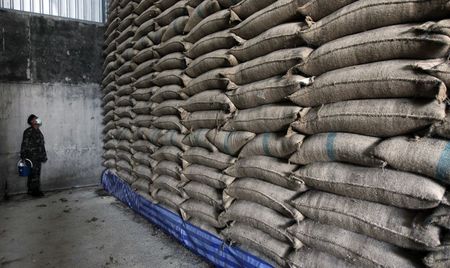Thailand looking to produce ethanol from rotten rice stocks – officials

By Apornrath Phoonphongphiphat
BANGKOK (Reuters) – Thailand’s military government is studying a plan to use rotten rice from state stocks to produce ethanol, hoping to make use of grains that have gone bad and help reduce losses from a costly rice-buying scheme, a senior government official said.
The government is estimated to have lost as much as 400 billion baht (£7.4 billion) in buying and storing 18 million tonnes of rice from farmers at higher-than-market rates in the scheme that started in October 2011 and ran through February this year.
After nearly completing a nationwide warehouse inspection, the government has found that about 20 percent of the stocks were missing or rotten, said Rangsan Sriworasart, permanent secretary for the Ministry of Finance and a member of the rice inspection committee.
Ethanol producers, however, were not sure the plan to use the rotten rice to make biofuel would be commercially viable, saying it could need government support.
“We just launched the idea to ethanol producers and we need to talk to them later to see what we could do to encourage them to produce ethanol from the rice,” Rangsan said.
He said ethanol demand was expected to rise substantially over the next few years, and using rice could help diversify raw materials for the biofuels sector in the future.
Nearly 3 million tonnes of rice in the state warehouses are rotten, said a Ministry of Finance official who asked not to be named as he was not authorised to talk to media.
HIGH COSTS
Based on higher-than-market-prices the government paid farmers at 15,000 baht a tonne, the cost of ethanol from rotten rice would be about 48 baht per litre, according to Siriwut Siempakdi, former president of the Thai Ethanol Manufacturing Association.
That is about twice the price of ethanol made from cassava and molasses.
“If rice-made ethanol is every expensive, no one will use it and the plan will be useless,” Siriwut said.
He said if the government wants to go ahead with the plan to produce ethanol from rotten rice, ethanol producers would need support from the government to help offset the costs.
Siriwut said ethanol factories that process cassava could switch to rice but that it would cost them to adjust their machines to the new raw material.
Factories that produce ethanol from molasses use machines that cannot process rice, he said.
Surong Bulakul, chief operating officer for infrastructure at Thailand’s PTT Plc.
“It’s a plan to try to make use of the rotten rice in some way rather than dump it. We have not started producing ethanol from rice yet,” Surong said.
Thailand has 20 ethanol factories, of which 14 use molasses as a raw material and 6 use cassava, according to the Thai Ethanol Manufacturing Association.
Overall ethanol production is at 3.9 million litres per day, while domestic consumption stood at 3.2 million litres per day, according to the association.
(Editing by Tom Hogue)